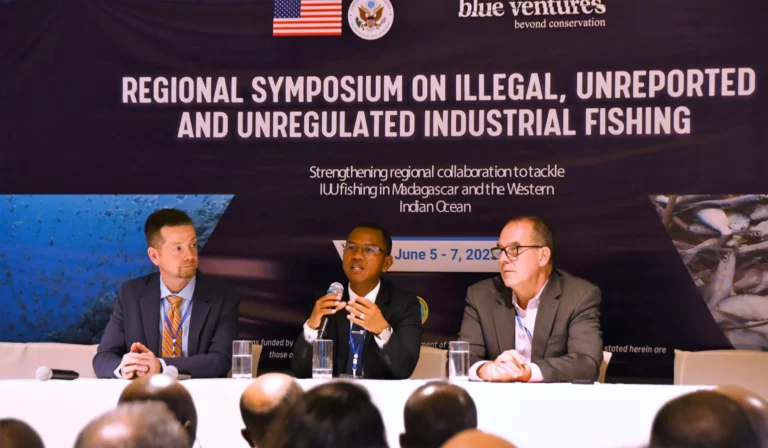Blue Ventures Conservation Madagascar, in partnership with the U.S. Embassy in Madagascar and Comoros, the Ministry of Fisheries and the Blue Economy, and the Institut Halieutique et des Sciences Marines is convening a regional symposium of fishery stakeholders from Madagascar, Comoros, Seychelles, and Mauritius – June 5th to 7th 2023.
This project was funded by a grant from the United States Department of State. This initiative is one of the other efforts that the U.S. Embassy has supported Blue Ventures through a grant of $227,000 to combat Illegal, Unreported, and Unregulated Fishing (IUUF) by increasing public and stakeholder awareness to reform policy for better results.
Fishery resources contribute to the food security of millions of people in the world and are especially important to island nations including Madagascar, Comoros, Mauritius, and the Seychelles. According to the United Nations, more than 600 million people depend on fisheries and aquaculture for their livelihoods.
However, the sustainable management of fishery resources is under increasing threat from Illegal, Unreported, and Unregulated (IUU) fishing. This term takes in a variety of fishing activities: illegal fishing refers to catches taken without the agreement of governments, unreported fishing – where catches are misreported to national authorities or not reported at all, and unregulated fishing where catches are taken in areas or for fish stocks without adequate management measures in place.
The Western Indian Ocean (WIO) region has enormous potential in terms of fishery resources, and estimates suggest that 30-60 million people in WIO coastal communities are dependent on the coastal environment for goods, services, livelihood, and income. Yet, the region that already suffers high levels of poverty and some of the highest food insecurity in the world is also an area of high IUU fishing activity compared to other ocean basins. IUU fishing results in an annual loss of 10 billion dollars to the global economy, with Madagascar alone losing an estimated 14 million dollars per year.
Despite measures being taken at both the national and regional levels to deter, eliminate and combat IUU fishing, this problem still persists and poses a significant threat to marine biodiversity, the livelihoods, and food security of coastal communities, and undermines the potential for a sustainable and equitable Blue Economy in the region.
Given the transboundary characteristics of IUU Fishing, efforts to tackle these issues require effective regional and international collaboration. Bringing together government representatives, civil society, and the private sector, the aim of this symposium is to catalyse the creation of a regional strategy and strengthen the regional network of actors in the Western Indian Ocean.
Many initiatives such as the Port State Measure Agreement (PSMA), the Fisheries Transparency Initiative, and the use of new technologies in surveillance of IUU Fishing activities are available and require political will and commitment from each state, as well as fishery actors, to be effective.
Specifically, the symposium will:
- Create a regional community of actors within the Western Indian Ocean to combat IUU fishing, with plans to organise regular meetings of the parties to update and monitor the implementation of the identified actions;
- Improve understanding around IUU fishing in the region; and
- Share and highlight the critical elements of responding to IUU fishing by the actors in the fishery sector.
“As part of the improvement of fisheries governance, we have committed to joining the FiTI, or Fisheries Transparency Initiative, and today we have become a candidate country. Madagascar will soon have its own strategy and a national plan to combat IUU fishing and intends to sign partnership agreements with NGOs such as Sea Shepherd and Global Fishing Watch for the implementation of this document. Furthermore, with the aim of reducing fishing efforts in its Exclusive Economic Zone (EEZ) and restoring fish stocks, our country has reduced the issuance of fishing licenses from 255 in 2020 to 69 today, prioritizing small-scale fishing and subsistence fishing. In addition to strengthening community surveillance, through the Regional Fisheries Surveillance Program (PRSP) and in collaboration with its partners, Madagascar plans to acquire 47 fishing surveillance vessels by the end of 2023 and intends to utilize modern technologies to enhance its surveillance system“. MAHATANTE Tsimanaoraty Paubert, Minister of Fisheries and Blue Economy.























